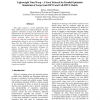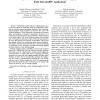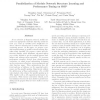91 search results - page 11 / 19 » Optimizing Student Models for Causality |
DSRT
2008
IEEE
13 years 9 months ago
2008
IEEE
This paper proposes a novel Lightweight Time Warp (LTW) protocol for high-performance parallel optimistic simulation of large-scale DEVS and CellDEVS models. By exploiting the cha...
ET
2010
13 years 5 months ago
2010
This work justifies several quantum gate level fault models and discusses the causal error mechanisms thwarting correct function. A quantum adaptation of the classical test set gen...
CLUSTER
2011
IEEE
12 years 7 months ago
2011
IEEE
—Computing systems will grow significantly larger in the near future to satisfy the needs of computational scientists in areas like climate modeling, biophysics and cosmology. S...
IPPS
2006
IEEE
14 years 1 months ago
2006
IEEE
As an extension of Bayesian network, module network is an appropriate model for inferring causal network of a mass of variables from insufficient evidences. However learning such ...
CDC
2009
IEEE
14 years 18 days ago
2009
IEEE
Abstract— Q-learning is a technique used to compute an optimal policy for a controlled Markov chain based on observations of the system controlled using a non-optimal policy. It ...



